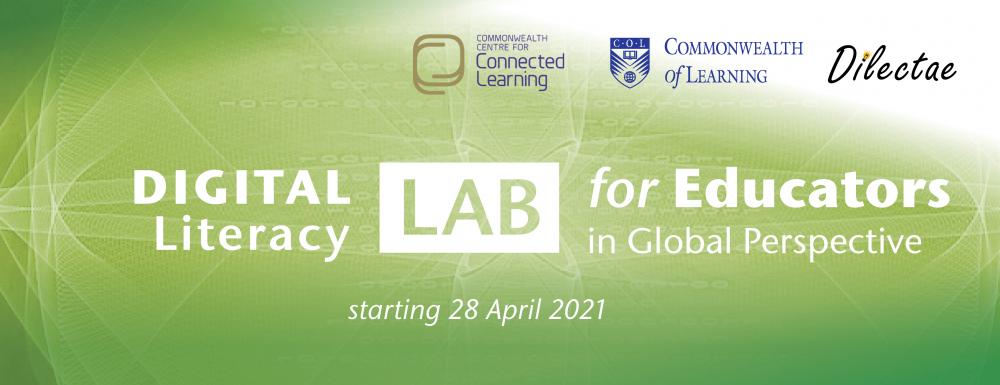Digital Literacy Lab for Educators in Global Perspective (Second Offering)

This portal is now inactive, and certificates are no longer issued. The Commonwealth of Learning (COL) will archive and provide access to the content. Visit https://oasis.col.org/ for more details.
Course Description
The irreversible reliance on digital technologies has elevated the importance to develop critical digital literacy skills around the world. Educators have an important role to play to engage with learners and push them to consider one’s interactions, behaviours, and consumption patterns online.
DLLE offers an essential course of personal and professional development for educators, learners and anyone interested in re-evaluating our current digital world. At the centre of this course is ‘netizenship’, coined by Michael Hauben to define the internet user as a positive contributor online. The course will consider how our digital world has reimagined conventional media, and will scrutinise the opportunities and challenges of online content creation and consumption whilst introducing strategies to guide our activity and improve our ‘netizenship’.
By the end of this course, participants will feel more empowered to share a fresh perspective on digital literacy to be shared with their personal and professional communities. The aim is for participants to become more active local champions of digital literacy for a better online world for all.
Course Contents
Week I – Introductory Module
In Week 1, learners will be introduced to:
• The Facilitator and Co-Facilitators; and
• The course method – a connected approach linking up digital literacy with conventional disciplines and embedding digital literacy development within critical thinking methods.
Week II – An Overview of ‘Digital Literacy and Society’
In Week 2, learners will explore the development of our digital world and the literacy required to navigate it through a critical overview of:
• The founding principle of the world wide web i.e. to facilitate communication to share knowledge and ideas;
• What our digital world contains, including media and how this has changed over time;
• The concept of ‘digital literacy’ and how it relates to traditional subjects/disciplines and our offline responsibilities as citizens;
• The role of ‘digital literacy’ in considering the opportunities and challenges presented by the ‘fourth Industrial evolution’;
• Digital Literacy as the essential C21st skill;
• Webinar: Live-chat session with Professor Shironica Karunanayaka, Open University of Sri Lanka.(Day/time
TBA)
Week III – Deepening Our Critical Understanding of ‘Digital Literacy and Society’
In Week 3, learners will develop a critical overview of the following areas:
• Opportunities and challenges posed to us as creators, consumers, teachers and learners;
• The Attention Economy;
• How our online consumption creates ‘value’ for private companies;
• Introduction of ‘Information Disorder’;
• The Urgency for Digital Literacy;
• Webinar: Live-chat session with Professor Jane Agbu, National Open University of Nigeria.(Day/time TBA)
Week IV – Digital Creations and Creators
In Week 4, learners will explore how to responsibly and meaningfully create online through a critical overview of:
• How digital creation differs from offline creation;
• The parameters of online creation, including introduction to a digital creation framework and the legalities of creating online;
• The impact of digital lifespans and our digital footprint;
• Cautionary tales of creating online;
• Webinar: Live-chat session with Dr George Onyango and DSVOL team, Kenyatta University. (Day/time TBA)
Week V – Digital Consumption and Consumers
In Week 5, learners will explore how to responsibly and meaningfully consume online through a critical overview of:
• How digital consumption differs from offline consumption;
• The parameters of online consumption, including introduction to a digital consumption framework;
• Cautionary tales of consuming online, including reference to the Covid-19 ‘infodemic’;
• Our Digital Creation and Consumption Landscape.
Week VI – Review
Target audience
The Digital Literacy Lab is designed for educators and lifelong learners from diverse backgrounds. Anyone interested in developing their own levels of digital literacy or supporting the acquisition of this essential 21st Century skill in other learners would benefit from participating in this course.
Outcomes of this Course
On successful completion of this course, participants are expected to be able to:
• Outline key components making up our digital world;
• Articulate what is meant by ‘digital literacy’ and ‘netizenship’;
• Explain the opportunities and challenges we face online;
• Demonstrate a critical understanding of our roles as creators and consumers online.
Certificates
The time commitment each week is up to 3 hours per week to engage with content, participate in webinars (3) and complete tasks.
Assessment will be based on:
a) Reading content (honour code);
b) Watching 80% of videos (captured in analytics); and
c) Two reflections: Week 1 and Week 6.
Reflections will be centred on open ended questions about your growth as a netizen in the course.
When participants satisfy these requirements, they will receive a Certificate of Completion.
Certificates will be awarded within two weeks of the completion of the course.
Copyright 2022· All rights reserved
Designed by Zymphonies

